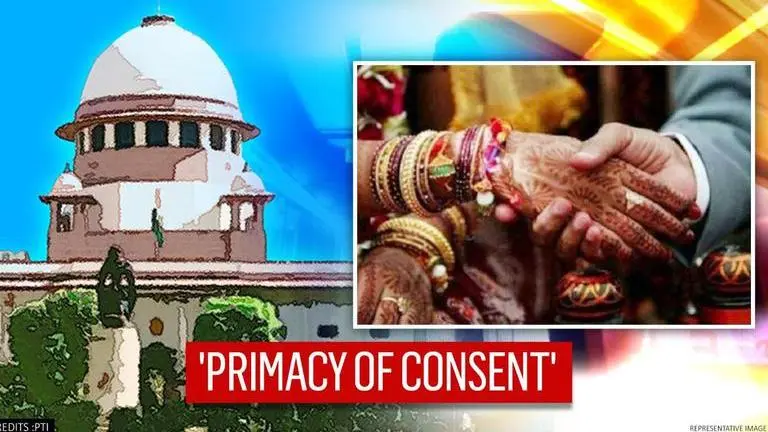Updated 12 February 2021 at 17:51 IST
Educated people choosing their own life partners can reduce caste & community tensions: SC
In a key judicial intervention, the Supreme Court ruled that the consent of two adult individuals who agree to enter into a wedlock has to be given primacy.
- India News
- 3 min read

In a key judicial intervention, the Supreme Court ruled that the consent of two adult individuals who agree to enter into a wedlock has to be given primacy. This assumes significance amid the growing perception that the anti-'Love Jihad' laws in some of the states undermine the agency of two adults when it comes to marriage. A division bench of the Supreme Court comprising Justices Sanjay Kishan Kaul and Hrishikesh Roy was hearing a plea filed by a married couple who alleged a threat to their life. Moreover, they sought the quashing of a FIR registered at the Murgod Police Station, Belagavi district of Karnataka.
Basically, the father of the bride registered a complaint at the aforesaid police station that his daughter was missing since October 14, 2020. However, it soon came to light that she had travelled from Hubli to Delhi without informing her parents and married an engineer whom she was acquainted with. Despite her assuring the Investigating Officer that she had married out of her free will, the latter insisted on her visiting the Murgod Police Station to record a statement so that the case could be closed. While the woman declined to do so citing a threat from her parents, the IO warned her that a false case might be registered by her family members following which her husband might be arrested.
Read: President Is Seized Of Balwant S Rajoana’s Plea For Commutation Of Death Penalty, Centre To SC
Advertisement
The SC verdict
Firstly, the apex court pointed out that the IO could have visited the woman's current residence rather than calling her to Karnataka. Deprecating his conduct in adopting these tactics, it directed that this officer must be sent for counseling on how to manage such cases. Additionally, the SC directed the police authorities to lay down some guidelines and formulate some training programmes within the next 8 weeks to handle such socially sensitive cases. Noting that both petitioners are majors, the bench observed that educated boys and girls choosing their own life partners is the way forward to reduce caste and community tensions.
Citing earlier judicial pronouncements, it added that the consent of the family is not necessary for two adults to enter into a wedlock. Quashing the proceedings in pursuance to the FIR registered at the Murgod Police Station, the top court expressed hope that the parents of the woman would accept the marriage and re-establish social interaction with the couple. Referring to Dr. Babasaheb Ambedkar's 'Annihiliation of Caste', it held that alienating the couple under the garb of caste and community is not a "desirable social exercise".
Advertisement
In paragraph 10 of the verdict dated February 8, the SC ruled, "We are fortified in our view by earlier judicial pronouncements of this Court clearly elucidating that the consent of the family or the community or the clan is not necessary once the two adult individuals agree to enter into a wedlock and that their consent has to be piously given primacy.1 It is in that context it was further observed that the choice of an individual is an inextricable part of dignity, for dignity cannot be thought of where there is erosion of choice. Such a right or choice is not is not expected to succumb to the concept of 'class honour' or 'group thinking'."
Published By : Akhil Oka
Published On: 12 February 2021 at 17:51 IST
